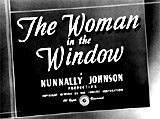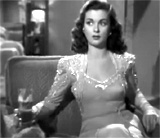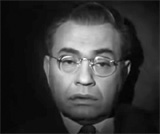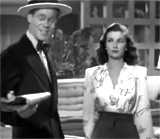
|
The Woman in the Window (1944)
In emigre director Fritz Lang's dark, noirish murder-melodrama
masterpiece - it featured a very detailed tagline that explained
the plot involving murder, intrigue, blackmail:
"A
too-beautiful woman, a too-carefree man - and an evening of gay flirtation
shifting madly into a panic of guilt and fear and crimson MURDER...That's
excitement for you."
The crime picture was originally to end with a suicide,
but a milder "it was all just a dream" Wizard of Oz conclusion
(a novel idea back in the 1940s) was substituted that was more suited
for the Production Code at the time. It was no coincidence that Fritz
Lang made another similarly-plotted film noir with the same three stars,
Robinson, Duryea and Bennett, titled Scarlet Street (1945) a
year later - his follow-up film.
- the film's main character was law-abiding,
mild-mannered, middle-aged and married Gotham College Asst. Professor
Dr. Richard Wanley (Edward G. Robinson) in NY, a teacher of criminal
psychology; he was destined to become enamoured by the
requisite femme fatale - the film's main character
- in the film's first scene, Prof. Wanley lectured
to a college class in front of a chalk board, with the words
"Sigmund Freud" printed in large letters [Note: Freud was known
for his major work The Interpretation of Dreams about the
unconscious - a key spoiler point]; Wanley spoke about "Some
Psychological Aspects of Homicide" and described the moral
differences and contrast in culpability between premeditated murder
and murder in self-defense
- later, at Grand Central Station
in NYC, Wanley said his goodbyes to his
family (wife and two children) who were leaving by train for a summer
vacation; on the first night of his "summer bachelorhood," the
stodgy professor ventured off for dinner, drinks, discussion, and
a cigar with his two similarly-aged friends at a local men's
club: District Attorney Frank Lalor (Raymond Massey), and Dr. Michael
Barkstane (Edmund Breon); the group first spoke to each other outside
the club at the art store next door, where they commented on the
"sweetheart" and "dream girl" in the portrait exhibited in the
window; they pondered what she might be in real-life
- to his friends, Wanley complained
that his domestic life had become routine, boring, conventional,
and unadventurous (the definition of a mid-life crisis)

Wanley With Two Friends Outside Men's Club
|

Wanley: "We are three old crocks"
|

Lalor: "We're like athletes who are out of condition..."
|
- the progression of the film was foreshadowed by
and the direct result of the theoretical ("academic") discussion
that Wanley had in the film's opening with his two close club friends
about the opportunities of 'bachelorhood' freedom (with his wife
and children away), but also the dangers of amorous temptation
for stodgy middle-aged elderly men who quit acting their age and ended up tragically:
Wanley: I'm a middle-aged man. We all are. We
are three old crocks...I hate this solidity, the stodginess
I am beginning to feel....To me, it's the end of the brightness
of life, the end of spirit and adventure.
Lalor: Don't talk like that. Men of our years have no business
playing around with any adventure that they can avoid. We're
like athletes who are out of condition. We can't handle that
sort of thing anymore.
Wanley: Life ends at 40, hmm?
Lalor: In the district attorney's office, we see what happens
to middle-aged men who try to act like colts. And I'm not joking
when I tell you that I've seen genuine, actual tragedy issuing
directly out of pure carelessness, out of the merest trifles.
Casual impulse, an idle flirtation, one drink too many....
I'm sorry if I sound stuffy. But trouble starts, too, from little
things, often from some forgotten natural tendency....
Wanley: The flesh is still strong but the spirit grows weaker by the hour....You
know, even if the spirit of adventure should rise up before
me and beckon, even in the form of that alluring young woman in
the window next door, I'm afraid that all I'll do is clutch my
coat a little tighter, mutter something idiotic and run like the devil
- afterwards as he sat back in a large easy chair,
Wanley enflamed his imagination
by reading sensuous and erotic Biblical verses in an illustrated
version of the Song of Solomon; he had asked the attendant to wake him up at 10:30
pm; with the clock chiming, he was stirred from sleep [Note: SPOILER
- From here on, everything was Wanley's 'dream']
- outside the club, Wanley
met beautiful, strange painting model and femme fatale Alice
Reed (Joan Bennett) - who materialized when she emerged as a reflection
in the portrait painting in the window of a nearby art gallery, near
to the entrance of the NYC men's club; he
risked his entire future after meeting up with her [Note: In retrospect,
she was a complete figment of his imagination, derived from the painting]

|

|
|
Their Initial Encounter In Front of the Painting
|
- wearing a diaphanous black dress and self-admitting
that she was "lonely," they went to a late-night club for a drink
at 11 pm before she invited him back to her apartment
via taxi; he reluctantly accepted her beckoning: "I was warned
against the siren call of adventure at my age. I should never
have stopped to talk with you. I should never, never have come
here to drink with you"
- at 12:10 pm after entering her mirrored apartment, they
sipped champagne and talked further; she showed him sketches of
herself by the portrait artist named Clemens; Wanley acted gentlemanly
although was allured by her body language and her see- dress
- then, at 1 am during a heavy rain, a taxi pulled
up, and Alice's hot-tempered, burly and jealous boyfriend "Frank
Howard" (Arthur Loft) abruptly and unexpectedly arrived

Alice's Enraged Boyfriend "Frank Howard" (Arthur
Loft) Asking: "Who are you?"
|

Alice Aiding Prof. Wanley by Passing Him a Pair of Scissors
|

While Being Strangled, Wanley's Back-Stabbing of "Frank
Howard" With the Scissors
|

Alice After the Self-Defense Murder ("What are we going to do?")
|
- the enraged boyfriend Frank immediately slapped
Alice and accused her of infidelity - he had misinterpreted Wanley's
presence; he then attacked and fist-punched the Professor in the
jaw and began choking him on the sofa; with a pair of scissors
handed to him by Alice (that he had been using to open the bottle
of champagne), Wanley stabbed the assailant "Howard"
to death in the back, in a scissors-backstabbing scene repeated
in Hitchcock's Dial M For Murder (1954)
- Professor Wanley became embroiled
in a crime and was soon 'on the run' due to his unintentional self-defense
murder; Alice informed him that she knew hardly
anything about "Frank Howard" - no one knew she was seeing him (a
few times a week), and no one had ever seen the two together; after
having second thoughts, the Professor decided against phoning the
police; he knew his life had changed forever: ("I'm ruined, my whole life")
- Wanley then asked a crucial question: "I was wondering
if we had the nerve for something, something pretty dangerous that
would shut the door on us completely if we were caught" - as they
plotted what to do next; without exchanging
his name with her, he and Alice opted for Wanley to return to his
apartment via subway and drive back in his retrieved car; to ensure
that Wanley didn't desert her and not return, he left his vest with
her (with a pen bearing his initials RW that she kept separately
and didn't return to him)
- there were tense moments when Wanley kept making
mishaps during the pick-up of the body - contact
with his garage attendant (Alec Craig), a traffic stop for driving
without his lights on, and a view of Alice by her returning upstairs
male neighbor
- meanwhile, Alice planned to thoroughly clean her
apartment, and discard the dead man's personal belongings (including
a pocketwatch with the monogrammed initials CM) into the river the
next day; at about 3 am, Wanley rolled the corpse into a
blanket and put it in his car's back seat; as Wanley drove to dispose
of the body far away in the country, he had further mishaps - a
lost dime at the Henry Hudson Parkway toll-booth and a clear sighting
by the toll-booth collector (Joe Devlin), and another view from
a motorcycle cop (Fred Graham) at a traffic signal
- during the cover-up, Wanley had left an immense
and obvious trail of clues, highlighting everything that could
be used against him, including witness sightings, his cut
right hand on barbed wire (when he dumped the body) and a trail
of blood, a muddy tire track, and two sets of muddy footprints
at the crime scene (one heavier than the other due to possibly
carrying something heavy), etc.
- at the club the next evening with his two buddies,
Wanley learned that his friend District Attorney Frank Lalor
was looking into the case of the recent disappearance of a wealthy
and prominent Wall Street financier-businessman of World Enterprises
Inc. who was returning from Washington, DC to NY, named Claude Mazard
[Note: With initials of CM, he was the one who had been using an alias
to engage in a secretive liaison with Alice; he had a reputation of
having a hot temper]; Wanley foolishly blurted out: "I see no reason
to assume that he's been murdered" - although murder hadn't been mentioned
- later that evening at 12 midnight, Wanley listened
to the radio news, prefaced by an ironically-funny commercial for
Castola Rex; it tauted that the product could balance "the chemical
contents of the gastric juices so carefully that heart burn, acid
stomach, or an upset digestive system resulting from over indulgence
in food and drink can blight a person's whole outlook on life.
But why suffer..." - something desperately needed by the nervous
Wanley; the news reported on the mysterious disappearance of the
famed financier
- the headlines from the next day's New York newspaper
read: "MAZARD MURDERED: Body Discovered by Boy Scout in Suburban
Woods"; in film newsreels, an enterprising
Boy Scout (George 'Spanky' McFarland of Our Gang and/or The
Little Rascals) boasted about finding the body in the woods, and
exclaimed: "If I get the reward, I will send my younger brother to
some good college, and I will go to Harvard"
- there were more tense scenes when Wanley listened
as DA Frank Lalor began to discuss his findings about how the corpse was brought to the woods
after the murder, and there were shoe prints and tire-marks of
a parked car; bits of a torn suit and blood were also found on
barbed wire; over time during their bantering talk, Wanley feared
that he looked more and more like the real suspect, and insinuated
that he was the guilty culprit by showing off his recent wound,
although the DA doubted his friend had ever committed a murder
- Lalor went on to theorize that the killer, and bachelor
Mazard's mistress, were now waiting it out and become distrustful
and fearful of each other: ("Now these two people, this man and
this woman, sit hating and fearing each other, each wondering how
long it'll be before the other is caught and blabs out the whole
story"); there was also further contradictory evidence that Mazard
had hired a bodyguard to follow him secretly at all times, but
the man hadn't shown up - probably because he was "a known crook
with a blackmailing record"
- the next day, Wanley became increasingly-desperate,
paranoid, and tense when he was pressured to accompany Lalor and
Inspector Jackson (Thomas E. Jackson), the head of the Homicide
Bureau, to visit to the crime scene; he absent-mindedly led them
directly to the crime scene, while remaining worried that there
was evidence of a scratch on his right hand from barbed wire and
a case of poison ivy acquired while he was dumping the corpse in
the woods; afterwards, Wanley retreated the car, feeling sick to
his stomach
- later that evening, Wanley received a brief phone
call from his "partner" Alice, who had traced down his identity
and location from the newspapers; shortly after, Alice was soon
marked as being involved in Mazard's killing by his
crafty, tough and sleazy bodyguard Heidt (Dan Duryea), nicknamed "Pappy," a
wanted ex-cop and criminal; he forced his way into her apartment,
frantically threatening blackmail and demanding $5,000 in cash,
by asserting that he could report her to the police instead and
collect the $10,000 reward; when he accused her of murder, she
asserted: "It's not me they're looking for!"; after meticulously
searching through her drawers, he found Wanley's absconded pen
(monogrammed RW), and deduced that the unidentified man was her
accomplice; she thought he might be bluffing: ("If you can get
$10,000 from the police, why would you be satisfied with $5,000
from me?"); he gave her until the following evening to return to
collect the cash
- while meeting in private
outdoors with Alice (behind an imprisoning iron fence), Wanley
knew that Heidt's $5,000 cash demand would never stop; he proposed
three approaches in dealing with the blackmailer: "There
are only three ways to deal with a blackmailer. You can pay him
and pay him and pay him until you're penniless. Or you can call
the police yourself and let your secret be known to the world.
Or you can kill him"; they briefly met again and she agreed
to murder him with an overdose of poison (a powdery substance
lent to her from Wanley's prescribed medicine)
- the next evening at 10 pm in her apartment during
Heidt's 2nd visit, Alice's attempt to be cooperative with Heidt
(by agreeing to run away with him), to pay him only part of his
$5,000 blackmailing demands ($2,900), and then to poison him with
a drink -- all failed; the extortionist became suspicious about
her pushy drink offer, and realized that he had been double-crossed;
he rifled through a shelf, and found Mazard's pocketwatch and the other
$2,100 dollars in blackmail money; before leaving with the cash
and evidence of Mazard's murder, he told Alice that she should
tell her "boyfriend- partner" that he would be returning the next evening for even more cash from
Alice - "another five grand"; once Heidt departed, Alice phoned
Wanley about her pitiful failure
|
2nd Visit - The Crafty Blackmailer Heidt (Dan
Duryea) in Alice's Apartment
|

|

|

|
- realizing that Heidt wouldn't give up, Wanley
felt that he had come to the end of his rope - and was preparing
to commit suicide with an overdose of his own prescribed drug ("a
gland concentrate" in powder form)
- however, he was unaware that as Heidt left Alice's
apartment, he was shot to death in a gun battle with police (Heidt
was assumed to be the financier's murderer after the "CM" watch
and the large wad of cash were found in his pocket - that
he had just absconded from Alice); Alice ran back to her apartment
and immediately phoned Wanley about the latest development, but
on her second attempt, no one answered; in his easy chair in his
home (seated next to a table in his home displaying family photographs),
Wanley lost consciousness after drinking the concoction [Note:
This might have been the film's original unedited finale]
- in the comic (cop-out and fizzling) surprise ending,
there was a change of setting; the Professor
was awakened in his own men's club by the hand of steward Collins
(Frank Dawson) nudging his shoulder, as the clock chimed: ("It's
10:30, Professor Wanley"); the entire plot had been a dream
of his subconscious!; he finished up the brandy (not poison) in
his glass, and realized - to his great relief - that everything
had been a troubling dream!
|
Wanley's 'Dream' at the Social Club - Upbeat
and Comic Twist Ending
|

Wanley Losing Consciousness in His Home's Easy
Chair
|

"It's 10:30, Professor Wanley" - Awakened
From Sleep
|

Charlie: Hat-Check Attendant
|

Ted: Doorman
|
- individuals in the club as he exited were characters in his dream: the hat-check attendant
Charlie (Arthur Loft) at the club was none other than the deceased "Howard"/Mazard!
Wanley exclaimed: "I can't tell you how happy I am to see
you alive and in such good health." And Ted, the doorman was
blackmailer Heidt (Dan Duryea)
- Wanley surmised that he had learned his lesson about being tempted by adventure; in
the actual ending on the street, when a female (hooker?) came up
to him in front of the painting and innocently asked: "Pardon
me, uh, will you give me a light?", he steadfastly refused
and hurriedly fled: "No, oh, no. Thank you, indeed. Not for
a million dollars!" The film ended on a close-up of the painting
|

Professor Wanley in Gotham College Lecture Hall
("Some
Psychological Aspects of Homicide")

Wanley Biding His Wife and Two Kids Goodbye For the Summer


Wanley's Viewing of Portrait, Next Door to His Men's Club

Wanley After Dinner and Drink, Sitting In Easy Chair and Reading 'Song
of Solomon'

Portrait Painting of a Woman in the Window - With an Additional
Reflection


Painting Model Alice Reed (Joan Bennett)


At a Late-Nite Club For a Drink


Alice and Wanley Plotting What to Do - To Cover Up
the Crime By Burying Body in Woods

Wanley Dragging Corpse From Back Seat of Car Into Woods

Newspaper Headlines: "MAZARD MURDERED"

Boy Scout Who Found Mazard's Corpse in Suburban Woods


District Attorney Frank Lalor (Raymond
Massey) Bantering About Case to Wanley

At the Crime Scene with Homicide Inspector Jackson and DA Lalor

Alice's First Contact with Wanley
(Her "Partner") After the Murder



Heidt Forcing His Way into Alice's Apartment, Threatening Blackmail

Alice Meeting with Wanley to Discuss Heidt's Bribe-Demands

Heidt's Incriminating Evidence: Claude Mazard's (CM) Initialed
Pocketwatch, and $5,000 Blackmail Cash

Wanley Preparing to Commit Suicide With an Overdose of
Sleeping Powder

Female Passerby to Wanley: "Will you give me a light?"
|



























